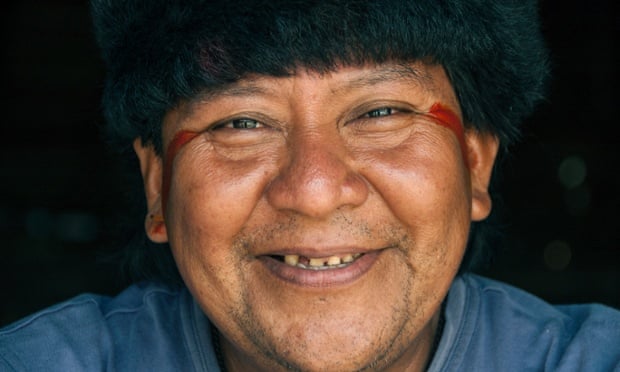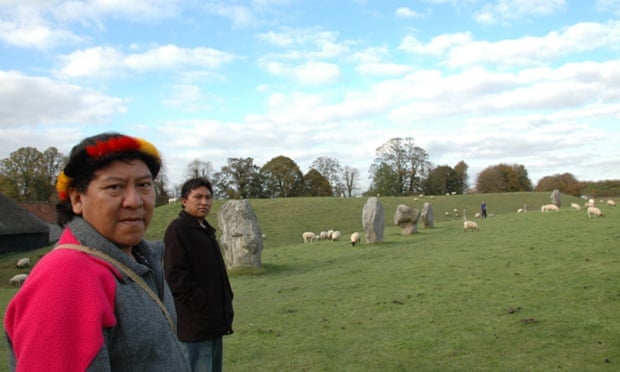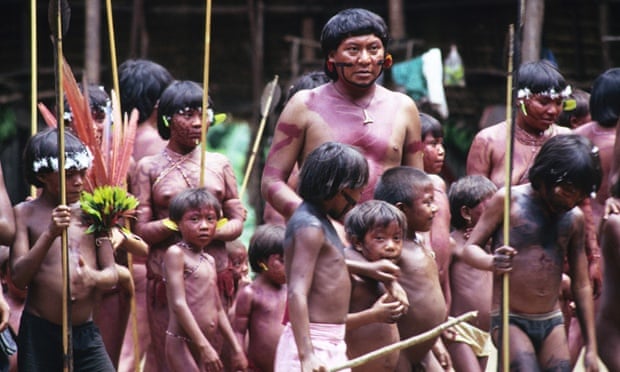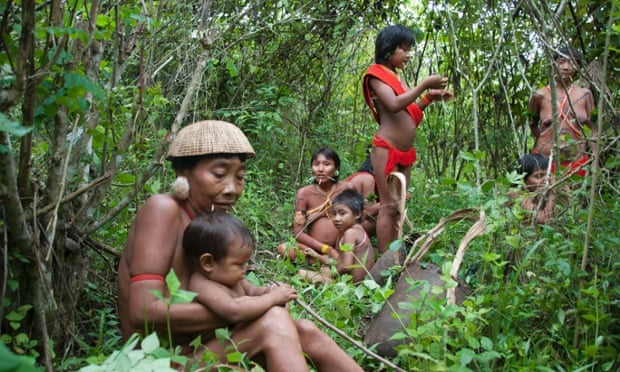Years ago I met a young Amazonian shaman, or spiritual leader, on his first visit to London. As we went down the escalator into the London Underground I could see he was nervous. All these white people rushing around under the city must be spirits or ghosts, he said. When we emerged, he was himself nearly white, shaken from his cosmological introduction to Britain.
That man was Davi Kopenawa Yanomami, who has since been dubbed the Dalai Lama of the Rainforest and is considered one of the most influential tribal leaders in Brazil. The Yanomami number about 30,000 and occupy a vast territory stretching across northern Brazil and southern Venezuela. They only made full contact with the west in the 1950s when their lands were overrun by thousands of gold prospectors and loggers. After waves of epidemics and cultural and environmental devastation, one in three of all Yanomami, including Davi’s mother, died.
Davi’s experience of white people has been dreadful but he is unusual because he trained not just as a shaman but also worked with the Brazilian government as a guide and learned western languages. In the past 25 years, he has travelled widely to represent indigenous peoples in meetings and, having lived in both societies, he has a unique viewpoint of western culture. With the help of an anthropologist, Bruce Albert, who interviewed him over several years, he has written his autobiography. It is not just an insight into what a Yanomami leader really thinks, but a devastating critique of how the west lives, showing the gulf between primordial forest and modern city world views.
Here, taken from his autobiography and conversations in London, are some of his observations of the rich north and its attitudes to consumerism, cities, wealth and nature.
On England
In this distant place, the wind does not blow without a reason and the rain does not fall by itself. But the beings of darkness and chaos are closer there. It is very cold. The night lasts a long time. The spirits in this ancient white people’s land are truly numerous. I was seized by such dizziness. Their ancestors did not take care of the forest in which they came into being the way ours did.
On western wealth
Their cities are full of big houses and innumerable possessions but their elders never give them to anyone. If they were really great men, should they not tell themselves that it would be wise to distribute them all before they make so many more? Do we ever hear the white people say: “Take all the machetes and pots that you see?” We people of the forest possess few things and we are satisfied. They are used to greedily hoarding their goods and keeping them locked up. They probably tell themselves: “I possess all these things alone. I am so clever, I am an important man. I am rich!”
On shopping
Their thoughts are constantly attached to their merchandise. They relentlessly and always desire new goods. I fear their euphoria of merchandise will have no end and they will entangle themselves to the point of chaos. They do not seem concerned that they are making us all perish with the epidemic of fumes that escape from all these things. They do not think that they are spoiling the earth and the sky, and that they will never be able to recreate new ones.
On New York
Multitudes of people here move very fast and in every direction, like ants. They look at the ground all the time and never see the sky. Yet while the houses in the centre of the city are tall and beautiful, those on its edges are in ruins. The people there have no food and their clothes are dirty and torn. They looked at me with sad eyes. These white men are greedy and do not take care of those among them who have nothing. How can they think they are so smart? They do not want to know anything about these needy people. They reject them, and let them suffer alone. They are happy to keep their distance and call them “the poor”. They even take their crumbling houses from them and force them to camp outside in the rain with their children. It scared me to see such a thing.
On western cities
Their cities are beautiful to see, but the bustle of their inhabitants is frightening. People there live piled up one on top of another and squeezed side by side, as frenzied as wasps in the nest. It makes you dizzy and obscures your thought. I can never think calmly in the city. People constantly ask you for money for everything, even to drink and urinate. Everywhere you go you find a multitude of people rushing, although you do not know why. Whenever I stay there too long I become restless and cannot dream.
On global warming
The white people’s thought is full of ignorance. They constantly devastate the land they live on and transform the waters they drink into quagmires! There is only one sky and we must take care of it, for if it becomes sick, everything will come to an end.
On war
White people reproach the Yanomami for arrowing each other, but they are the ones who really wage war. I watched them on television fighting each other for oil with their aeroplanes in a land with no trees. We do not fight with the same hardness as they do. If one of our people is killed by arrows or sorcery blowpipes we only respond by trying to kill the enemy who ate him. This is different from the wars with which the white people mistreat each other. They fight in great numbers. They even kill their women and children. They simply make the wars for bad talk, to grab new land for minerals, to tear minerals out of the land.
On work
White people are greedy and make people suffer at work, to extend their cities and accumulate merchandise there. This merchandise is like a fiancee to them. They are really in love with it. They go to sleep thinking about it like we doze off with the nostalgia of a beautiful woman. They dream of their car, their house, their money. Merchandise makes them euphoric.
On politics
I have often travelled to the white people to defend our forests and I know a little of what they call politics. It really made me become more suspicious. Their politics is nothing but mixed-up talk, the words of people who try to deceive.
On drink
They drink beer and, having become ghosts, face off like chickens or starving dogs until they have killed each other. They do it out of jealousy or for gold and do not lament their dead but abandon them. We only go to war to avenge ourselves out of anger for the mourning we feel.
On illness
The white people work in a ghost state and constantly swallow the wind of factory and machine fumes. The [fumes] go into their noses, their mouth and their eyes, and stick to their hair. This is why white people are so sick. Their doctors may open their chests, stomach or eyes but it does not help them. The sperm of fathers whose flesh is tainted by this epidemic smoke become sick and their children are born in bad shape.
On the environment
When they speak about the forest, white people often use the word “environment”. What they refer to in this way is what remains of everything they have destroyed so far. I don’t like this word. The Earth cannot be split apart as if the forest were just a leftover part. With leftover trees and leftover rivers, leftover game, fish and humans who live there, its breath of life will become too short. That is why we are worried. We shamans simply say we are protecting nature as a whole thing. We defend the forests’ trees, mountains and rivers, its fish, game, spirits and human inhabitants. We even defend the land of the white people beyond it and all who live there.
On conversation
You have to press together to understand each other when you speak. The roar of the machines and motors stands in the way of all the other sounds. The babble of televisions covers all other voices. White people are always worried. Their thoughts become scattered, seized with dizziness. This is how you become stupid.
On destruction
The white people want to kill everything. They will soil the rivers and lakes and finally take what is left. They won’t leave anything alive. They think we are not human beings and they all hate us. We also have a mouth and eyes, blood and bones, we are all hungry and thirsty, too. We all have the same fold behind our knees so we can walk! But where do the white people get this fierce desire to destroy the forest and its inhabitants?
On ageing
The lives of white people who hurry like ants seem sad to me. They are always impatient and anxious. They barely sleep, and run all day in a daze. They live without joy and busy themselves with acquiring new merchandise, their minds empty. Once their hair is white they disappear and the work – which never dies – survives them without end. Then their children continue to do the same thing.



